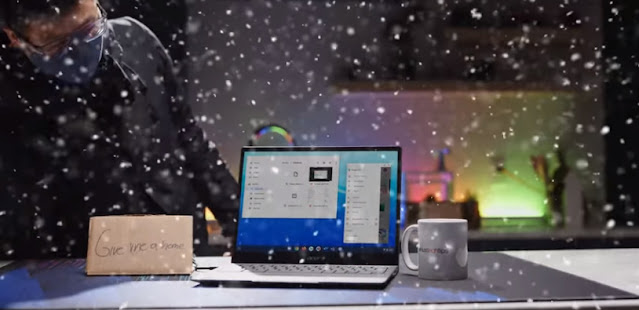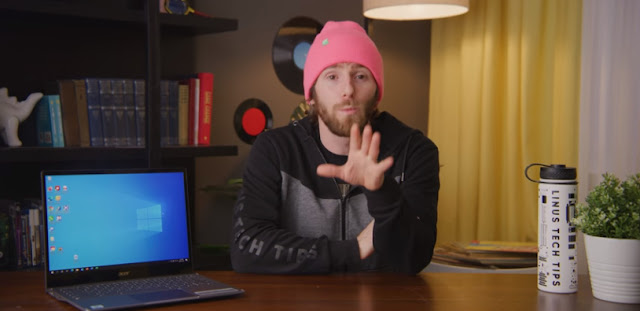Let’s get one thing straight here. I like Windows, okay

Yep, that is a complete Windows 10 installation running inside Chrome OS. Absolutely perfect. I like Chrome books now. They’re great. And so is our sponsor. This is the Acer Spin 713. It’s a Chrome book for big kids.
But really the big boy pants that it wears to the party is that it runs Chrome Enterprise, a suite of business focused extra features like advanced security protections and device management. That’s because this unnatural union is actually a result of a partnership between Google and Parallels, the company that’s best known for running operating systems inside other ones using virtual machines.
And what better way than a sweet, targeted exclusivity deal. Options already exist for doing just that. The best one is Crossover which lets you run individual Windows apps through the WINE compatibility layer for Linux. But the apps that we wanted to install using Crossover weren’t in their official list and the installation got stuck every time.
When you compare that to this, well, right off the bat, Parallels gets points for just running. And if you never bump the screen edges with your mouse you might just be able to delude yourself into thinking this is just a regular Windows laptop, if it wasn’t for the confusing keyboard layout and the really low screen refresh rate.

As strange as it is to say though, once you get used to that choppiness overall performance is actually not bad. The Windows 10 version of Geek bench delivered only a slightly worse score than the Android version using the same hardware here. And Photoshop was a lot more usable than it was on Microsoft’s own ARM-based Surface Pro X.
Parallels also offers cross OS integrations that sweeten the experience. Shared folders are set up by default. So you can easily access any file from either operating system. Chrome OS printers are automatically accessible in Windows.
You can even set Chrome OS as the default browser in Windows so links will open a new tab outside of Parallels.
While there’s clearly some optimization that still needs to happen, the fact that a Chrome book is running a full fat installation of Windows 10 at all is a big deal.
Parallels owes its Chrome book venture to the fact that newer Chrome books are coming with specs that would have been absolutely unheard of in the early days. They are for serious business too. It’s come a long way since the start.
I mean, you can even install Linux versions of Firefox, Vivaldi, or Brave, and not even use the Chrome browser at all on a Chrome book. That’s a hilarious prank to play on our old friend, Google.
As for the support that is there, again, it’s kind of jank. Like our Chrome Enterprise installation just refused to connect to our servers for file sharing here at the office.
I mean, don’t get me wrong. The simplicity of Chrome books is perfect for people who isn’t got time for that. But it’s definitely not for the Linus’s of the world. So having Windows on your Chrome book is an imperfect way then to fill in some of those holes in Chrome OSs functionality, at least for now.
But they’re certainly trying. In an interview with The Verge a Google rep likened Chrome OS to a state-of-the-art home theater setup and Windows to the dusty VCR that you keep around to play those old home videos. I believe this is what the Zoomers refer to as a Bruh moment. Anyway though, Google, if your plans for the future still involve this wacky keyboard layout you can count me out.
Honestly, I need to talk about this for a second. Chrome books have a search key which fulfills sort of a similar role to the Windows key, or the Command key on a Mac.
I mean, sure, you can press alt search and activate caps lock, and alt backspace to forward delete, since the delete key is also missing. But, uh oh, neither of these shortcuts work in Windows 10 because pressing alt highlights the menus.
I meant to convey that I was mad about this, and that I was yelling, but there’s no caps lock, Google. I don’t want a line graph. Also, Acer, this track pad, unusable. It just doesn’t register small movements and can even move the cursor backwards sometimes. Like I love all the ports, the keyboard, the screen, just get rid of this part.
While Windows laptops saw some growth in 2020, probably due to that pandemic thing, that growth was absolutely dwarfed by the increase in sales of Chrome books, which already dominate the education market. And I’m going to make a similar point to the one that I made in our Pixel book Go review.
They’ll be laying the groundwork for a future where kids, who have used Chrome books their whole life in school, grow up, enter the workforce, and choose the laptop they’re more familiar with. So there we go, I guess. That’s the reason.

Windows isn’t available on non-enterprise Chrome books. There’s a plan here, man. Things are in motion. Are you awake? Awake to hear this message from our sponsor, Nice Hash?
No registration is needed. And Nice Hash is also an exchange so you can trade your coins into other crypto currencies. Also they have a hash-power brokerage that you can simply rent out your machines so that other eager miners can take advantage of the power.
You’ll even get paid in Bit coin. between the Surface Pro X running Windows on ARM and the MacBook Pro running Apples M1 SOC which is also AARM. Who will win? Spoiler alert, the Mac, but still interesting..
